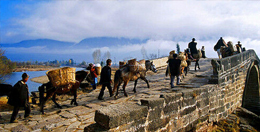Travelling through Dali with a Leg of Ham
Like author Zhang Mei, I am fascinated by Chief Li, the ethnic Bai leader of the Stone Dragon Village. It's a tiny place, with about a thousand folks tucked into the mountains near Dali in Yunnan province.
Chief Li's position suggests he's a small-town bureaucrat, but as I read Zhang's new book, Travels Through Dali With a Leg of Ham, a different picture emerges. Chief Li sees himself in charge not of a place or its people, but its music. He tells Zhang, and clearly anyone else who asks, that he is known as the "Folk Music King".
Zhang is on a tour as literal as the title of her book: In the first chapter, she procures a leg of the traditionally hand-cured ham that she remembers from her childhood in Dali. Fifty pages and a few recipes later, she and three colleagues arrive in Jianchuan county eager to share the ham with local cheese makers, the "pickle lady" of Weishan, a Spanish chef at a Dali farm restaurant, and regionally known folksingers like Chief Li.
First, Chief Li yields the stage-the concrete yard of the government office-to energetic young singers and dancers of the village. But soon he fetches a colorful waistcoat and his guitar, and sings a song about love. "His vocal chords let loose," Zhang writes, "revealing a rich, gravelly voice imbued with sadness, wisdom and romance. The façade of government formality disappears."
Next comes a song called The Mud Fish. The words are those of a fish that is about to be eaten, but the song is metaphorical, a lament about the plight of a humble farmer.
As Zhang recounts from this songburst: "He might be a little fish, Chief Li sings, but at least his bones will scratch the throats of his masters on the way down."
I thought this was a book about ham, you are probably thinking-and you are right. But for Zhang, ham is something of a metaphor too, a symbol of ordinary life in her birthplace and the ordinary people who shape the culture in sleepy villages not far from tourist hot spots like Dali Old Town.
As a teenager, Zhang was bored by the "perfect" climate and the slow pace of Yunnan, and couldn't wait to escape to the energy and bright lights of the world beyond. Her escape began in the United States with her acceptance at Harvard Business School and then a job as a consultant for McKinsey.
At a recent talk, Zhang got a laugh from a bookstore crowd when she described her first encounter with a bland ham-and-cheese sandwich in the US.
"This is ham?" she remembers asking.
One day, her American father-in-law shipped a whole smoked ham to her, and she was stunned as she nibbled at slices of the rich, salty meat. It was a Virginia ham, a famous product of that US state, and quite like the ham she knew from home.
Since then she has traveled the world, discovering Iberico ham in Spain and Parma ham in Italy and many more. But what she remembers most was sharing those foods with locals and hearing their stories-the sort of experience she has tried to capture in the travel company she later founded, Wild China.
"When people first begin to travel," she says, "they tend to collect destinations-to go to as many places as they can. Sort of like collecting stamps. But eventually travel becomes more than getting a selfie at the Great Wall or the Eiffel Tower: People want to experience local lifestyles that are very different from their own."
While travelers may encounter language and culture barriers, she says, they have one thing in common with people anywhere in the world.
"They eat," she says, grinning.
That gave her the starting point for a book she had long wanted to write about her native Yunnan.
She shakes her head quickly when I ask if she had been on a mission to relive her childhood.
"When you go back to a place, whether it's home or another place that you have loved, it's a chance to look at it with new eyes. Visually, Yunnan has changed so much that it looked very different.
"But the smells and tastes-the cooking, the herb harvesting, those were straight out of my childhood."
Each time she returns to Yunnan, she says, she remembers a Chinese saying: "When you are actually living in the mountain, you can't really see the beauty of the mountain, but when you step away you see the grandness."














